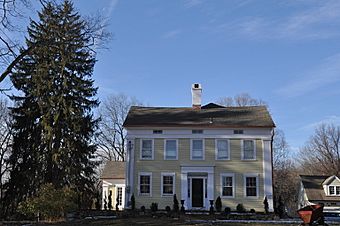Reuben Curtiss House facts for kids
Quick facts for kids |
|
|
Reuben Curtiss House
|
|
 |
|
| Location | 1770 Bucks Hill Rd., Southbury, Connecticut |
|---|---|
| Area | 6.7 acres (2.7 ha) |
| Built | 1840 |
| Architectural style | Colonial Revival, Greek Revival |
| NRHP reference No. | 93000658 |
| Added to NRHP | July 29, 1993 |
The Reuben Curtiss House is a really old and special house in Southbury, Connecticut. You can find it at 1770 Bucks Hill Road. This house has been around for a long time. Parts of it were built in the late 1700s and changed in the 1800s. It's a great example of a building style called Greek Revival architecture. Because it's so important, it was added to the National Register of Historic Places in 1993.
Discover the Reuben Curtiss House
The Reuben Curtiss House sits in a quiet area of Southbury. It's east of the town center, on Bucks Hill Road. This house is a large, two-and-a-half story building. It's made of wood and has a pointed roof.
What Does the House Look Like?
The house has a classic look with a central chimney. Its outside walls are covered with clapboards. These are long, thin boards that overlap. The front of the house has five window sections. It also has wide corner posts that reach up to a decorative border. This border has small windows for the attic.
The main front door is in the middle. It's set back a bit, with tall, narrow windows on the sides. The doorway itself is framed by decorative posts and a fancy top. The back parts of the house mix old styles. They blend well with the main front section. Inside, the house has many different looks. This shows how long it has been around and how it has been used.
A Look Back in Time
We don't know the exact year the oldest part of the house was built. The Curtiss family owned this land a long time ago, in the early 1700s. We know a house stood here, or nearby, in 1740.
Experts think the top part of the main house was built in the late 1700s. This was probably done by Reuben Curtiss. The house looks the way it does now because of changes made around 1840. At that time, the building was lifted up. A new first floor was built underneath it. Between 1840 and 1866, another Reuben Curtiss used the property. He ran a school for boys there!
 | Chris Smalls |
 | Fred Hampton |
 | Ralph Abernathy |



